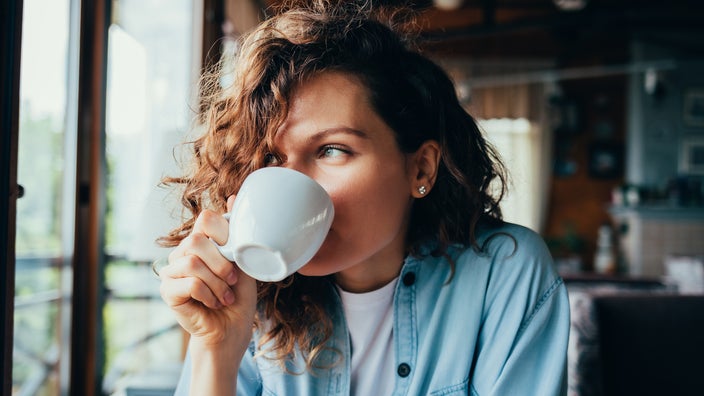
Why Does Coffee Make You Poop?
Key takeaways:
Coffee brings on a quick bowel movement for some people.
There are a few different ways that coffee works on the digestive system.
We’re still learning about coffee’s effects on the body.

Are you one of the millions of people in the world who drink coffee? If you are, you may have noticed that your morning cup of coffee wakes up both your brain and your bowels. For some people, coffee brings on a quick trip to the bathroom. It’s not clear exactly why this is, but studies are beginning to give some answers.
Why does your morning cup of coffee cause bowel movements?
There are several known reasons why coffee can make some people poop. Coffee has more than 1,000 different substances, and some may help stimulate your digestive tract. But it’s not clear exactly which compounds have this effect. Here are a few explanations.
1. Caffeine stimulates your brain — and your gut
Most people drink coffee because the caffeine perks them up in the morning. Caffeine is considered a stimulant. But it doesn’t just make you feel more clear-headed. It can also stimulate the muscles in your digestive tract. Caffeine increases motility (movement) in the colon, which helps move food toward the rectum.
Search and compare options
But caffeine may have other effects. One study showed that caffeine relaxes the anal sphincter, which is the part of the body that keeps stool in or lets it out. This makes it easier to poop.
2. Coffee releases gastrin
The lining of your stomach makes a hormone called gastrin. Coffee sends a signal to your stomach to release gastrin. This kicks off a wave of contractions in your gut called peristalsis. Peristalsis moves food and liquid through the intestines. For some people, this leads to a bowel movement.
Caffeinated and decaf coffee both cause your stomach to release gastrin. The effect is less intense with decaf coffee, but it’s still there.
3. Coffee triggers the gastrocolic reflex
The gastrocolic reflex is when muscles, nerves, and hormones work together to move solids and liquids through the intestines. When you eat or drink, this stimulates the gastrocolic reflex to move stool down toward your rectum.
Many things affect this reflex. Simply eating or drinking something, like coffee, can stimulate it. Also, the gastrocolic reflex is naturally more active in the morning. This may be part of the reason that a morning cup of coffee is more likely to make you poop than if you drink coffee at other times of the day.
Does decaf coffee also make you poop?
Yes, decaf can make you poop, though maybe not as much as regular coffee. For a long time, it was thought that caffeine was fully responsible for getting the intestines moving. But the gastrocolic reflex and coffee’s effect on gastrin suggest that there’s more at work than just caffeine. Caffeine seems to make a difference, but it’s not the whole story.
Is decaf coffee healthier than regular? Here’s what’s known about the benefits of decaf coffee.
What foods can cause diarrhea? If you have diarrhea, try to avoid these foods, which can worsen your symptoms.
Constipation relief: These foods can help you get more regular.
Do different types of coffee drinks affect your body differently?
Coffee itself can make you have to poop. But the things you may add to coffee can also affect bowel movements. For example, dairy products like milk or cream can cause bloating, gas, and loose stool for people with lactose intolerance.
There are probably some small differences in the amount of caffeine and other components in different types of coffee like light roast, dark roast, and cold brew. So far, it doesn’t seem like there’s enough of a difference to cause a change in bowel movements for most people.
But some of us are sensitive to small changes in diet, so it helps to be aware of how your body reacts to different kinds of coffee.
Read more like this
Explore these related articles, suggested for readers like you.
Does coffee help with constipation?
It depends. For some people, coffee may help with a bowel movement. But you’ll need more than that to keep you regular. Good bowel health requires a diet with plenty of fiber, regular exercise, and drinking enough fluids every day.
If you find that coffee helps you poop, you should only enjoy it from a cup. Coffee enemas are sometimes promoted as a way to treat or prevent different health conditions. But this use of coffee is risky and can damage your body.
Frequently asked questions
Coffee and caffeine can increase gut motility, or how fast food moves through you. If it’s too fast, there’s less time for water to be absorbed. So your poop may be more watery, like diarrhea. More than 2 to 3 cups of coffee may cause loose stools. If you get diarrhea after drinking coffee, consider cutting back on the amount you drink.
Drinking coffee in moderation is thought to have some health benefits. But coffee and caffeine affect people in different ways. Having up to 400 mg of caffeine per day is considered safe for most adults. That’s about three 12 oz cups of regular coffee. But people have different levels of sensitivity to caffeine, so this amount may trigger stomach issues in some people.
If your cup of coffee causes food to move through your system too quickly, it may cause diarrhea and gas. And if you are lactose intolerant, adding dairy products like milk to your coffee can cause gas and other symptoms.
The bottom line
You’re not imagining it: Coffee may make you poop in the morning. Caffeine is one way it stimulates your digestive tract. But there are other explanations. Drinking anything, including coffee, can trigger the gastrocolic reflex, which sets your digestive tract in motion. And there are about 1,000 different substances in coffee, and some may have effects on your gut. Some people may need to cut back on coffee if it leads to symptoms like diarrhea or gas.
Why trust our experts?



References
Acquaviva, F., et al. (1986). Effect of regular and decaffeinated coffee on serum gastrin levels. Journal of Clinical Gastroenterology.
American College of Cardiology. (2022). Studies find drinking two to three cups of coffee a day may benefit the heart.
Angeloni, S., et al. (2021). Characterization of the aroma profile and main key odorants of espresso coffee. Molecules.
Brown, S. R., et al. (1990). Effect of coffee on distal colon function. Gut.
International Foundation for Gastrointestinal Disorders. (n.d.). Common causes of chronic diarrhea.
Iriondo-DeHond, A., et al. (2021). Effects of coffee and its components on the gastrointestinal tract and the brain–gut axis. Nutrients.
Lohsiriwat, S., et al. (2008). Effects of caffeine on anorectal manometric findings. Diseases of the Colon and Rectum.
Rao, S. S., et al. (1998). Is coffee a colonic stimulant? European Journal of Gastroenterology and Hepatology.
U.S. Food and Drug Administration. (2024). Spilling the beans: How much caffeine is too much?





























